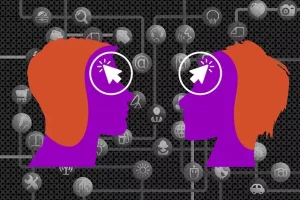
Interactive, multimedia learning environments provide far more stimulation than traditional textbooks.
Images, video, and links to extra material can enthrall and overwhelm, but do all those extras really lead to enhanced learning?
Initial research has indicated somewhat disappointing results for the potential gains from multimedia learning environments. One possible reason is that students need useful study strategies in these situations, even more so than with traditional materials.
Research conducted by Roger Azevedo and Jennifer Cromley at the University of Maryland indicates that certain learning strategies may well help. Their idea was that students who are trained in “self-regulated learning” would be able to use media rich environments effectively. Self-regulated learning means to pay attention to how well you are learning and adapt what you are doing when the learning is not going well. It’s a scientific approach to thinking about how students put study skills into practice.
Azevedo and Cromley gave students about 30 minutes of training in self-regulated learning. The training described how to assess difficulty of the learning task, monitor ones’ understanding of the material, and other strategies for learning, such as activating prior knowledge.
One of the study skills they taught was to try to relate new information to past knowledge about the topic. For example, a student who is learning about the circulatory system with multimedia in a high school class may be reminded of learning about the role of red blood cells from a middle school health class. When this happens, it’s good to take a moment to try to remember more about the previous lesson, and how it ties in to the new information.
The researchers found that training students with study strategies improved their learning process and their ultimate understanding of subject matter in a multimedia learning environment.
They used a think-aloud procedure to assess how well the participants employed the learning strategies taught to them. In a think-aloud method, study participants talk out loud, reporting on everything that’s going through their mind, as they undertake the primary learning task.
Transcripts of the verbal reports indicated that the trained students were more focused on their internal learning processes. They paid attention to how well their own learning was going. They also used the strategies taught to them more often than students who received no training.
Students who did not get the training were more focused on the technology aspects of the multimedia learning environment, and used relatively inefficient strategies for learning.
The researchers published their findings in the Journal of Educational Psychology, and the results provide encouragement to the possibility of training people to use sophisticated learning strategies to successfully understand complex information presented in multimedia learning environments.
Image credit: geralt

I love the way you wrote this article. This is wonderful. I do hope you intend to write more of these types of articles. Thank you for this interesting content!